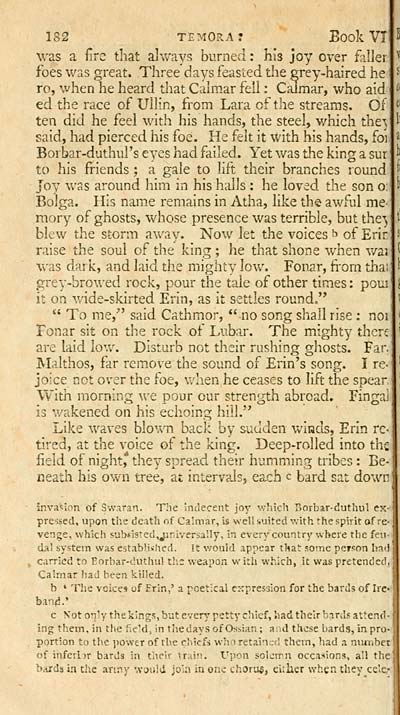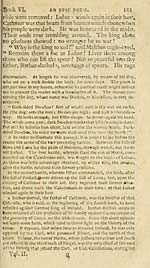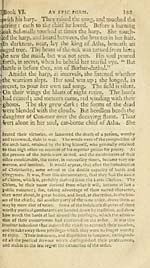Download files
Complete book:
Individual page:
Thumbnail gallery: Grid view | List view

182 temora: Book VI
was a fire that alv/ays burned : his joy over filler
foes was great. Three'days feasted the grey-haired he
ro, when he heard that Calmar fell : Calmar, who aid
ed the race of Ullin, from Lara of the streams. Of
ten did he feel with his hands, the steel, which the^
said, had pierced his foe. He felt it with his hands, foi
Borbar-duthul's eyes had failed. Yet was the king a sur
to his friends ; a gale to lift their branches round
Joy was around him in his h;ills : he loved the son o:
Bolga. His name remains in Atha, like the awful me^
mory of ghosts, whose presence was terrible, but the")
blew the storm away. Now let the voices ^ of Erir
raise the soul of the king ; he that shone when v/ai
Vv'as dark, and laid the mighty low. Fonar, from thai
grey-browed rock, pour the tale of other times: poui
it on wide-skirted Erin, as it settles round,"
" To me," said Cathmor, " no song shall rise : noi
Fonar sit on the rock of Lubar. The mighty thcrf
are laid low. Disturb not their rushing ghosts. Far.
Malthos, far remove the sound of Erin's song. I re-
joice not over the foe, when he ceases to lift the spear
With morning we pour our strength abroad. Fingaj
is wakened on his echoing hill."
Like waves blown back by sudden winds, Erin re-
tired, at the voice of the king. Deep-rolled into the
field of night* they spread their humming tribes : Be-
neath his own tree, at intervals, each c bard sat down
inva<;Ion of Swaran. The aitlecent joy v:hich Borbar-duthul ex-
pressed, upon the death of Ca'mar, is well suited with the spirit of re-
venge, which yab*i9ted,jiniversa'.ly, in every country where the feu
dal system was estaMiuhed. It would appear that some person had
, carried to Eorhar-duthul th: weapon with which, it was pretended,
Calmar had been killed.
b ' The voices of Erin,' a poetical expression for the bards of Ire-
ban4.'
c Vot only the kings, but every petty cliief, had their hards attend •
ing them, in the fie-dj in thedaysofOssian; and those bards, in pro-
portion to the power of the chiefs who retained them, had a niuribet
'•i inferi)r bards in their train. Upon sok'n?.n occasions, all the
■ -.rds in the an.-^y •.vauld jo':i in one chorus, either when they^cele
was a fire that alv/ays burned : his joy over filler
foes was great. Three'days feasted the grey-haired he
ro, when he heard that Calmar fell : Calmar, who aid
ed the race of Ullin, from Lara of the streams. Of
ten did he feel with his hands, the steel, which the^
said, had pierced his foe. He felt it with his hands, foi
Borbar-duthul's eyes had failed. Yet was the king a sur
to his friends ; a gale to lift their branches round
Joy was around him in his h;ills : he loved the son o:
Bolga. His name remains in Atha, like the awful me^
mory of ghosts, whose presence was terrible, but the")
blew the storm away. Now let the voices ^ of Erir
raise the soul of the king ; he that shone when v/ai
Vv'as dark, and laid the mighty low. Fonar, from thai
grey-browed rock, pour the tale of other times: poui
it on wide-skirted Erin, as it settles round,"
" To me," said Cathmor, " no song shall rise : noi
Fonar sit on the rock of Lubar. The mighty thcrf
are laid low. Disturb not their rushing ghosts. Far.
Malthos, far remove the sound of Erin's song. I re-
joice not over the foe, when he ceases to lift the spear
With morning we pour our strength abroad. Fingaj
is wakened on his echoing hill."
Like waves blown back by sudden winds, Erin re-
tired, at the voice of the king. Deep-rolled into the
field of night* they spread their humming tribes : Be-
neath his own tree, at intervals, each c bard sat down
inva<;Ion of Swaran. The aitlecent joy v:hich Borbar-duthul ex-
pressed, upon the death of Ca'mar, is well suited with the spirit of re-
venge, which yab*i9ted,jiniversa'.ly, in every country where the feu
dal system was estaMiuhed. It would appear that some person had
, carried to Eorhar-duthul th: weapon with which, it was pretended,
Calmar had been killed.
b ' The voices of Erin,' a poetical expression for the bards of Ire-
ban4.'
c Vot only the kings, but every petty cliief, had their hards attend •
ing them, in the fie-dj in thedaysofOssian; and those bards, in pro-
portion to the power of the chiefs who retained them, had a niuribet
'•i inferi)r bards in their train. Upon sok'n?.n occasions, all the
■ -.rds in the an.-^y •.vauld jo':i in one chorus, either when they^cele
Set display mode to: Large image | Transcription
Images and transcriptions on this page, including medium image downloads, may be used under the Creative Commons Attribution 4.0 International Licence unless otherwise stated. ![]()
| Early Gaelic Book Collections > Ossian Collection > Poems of Ossian, the son of Fingal > Volume 2 > (192) |
|---|
| Permanent URL | https://digital.nls.uk/77915017 |
|---|
| Shelfmark | Oss.54 |
|---|---|
| Attribution and copyright: |
|
| Description | Selected books from the Ossian Collection of 327 volumes, originally assembled by J. Norman Methven of Perth. Different editions and translations of James MacPherson's epic poem 'Ossian', some with a map of the 'Kingdom of Connor'. Also secondary material relating to Ossianic poetry and the Ossian controversy. |
|---|
| Description | Selected items from five 'Special and Named Printed Collections'. Includes books in Gaelic and other Celtic languages, works about the Gaels, their languages, literature, culture and history. |
|---|

